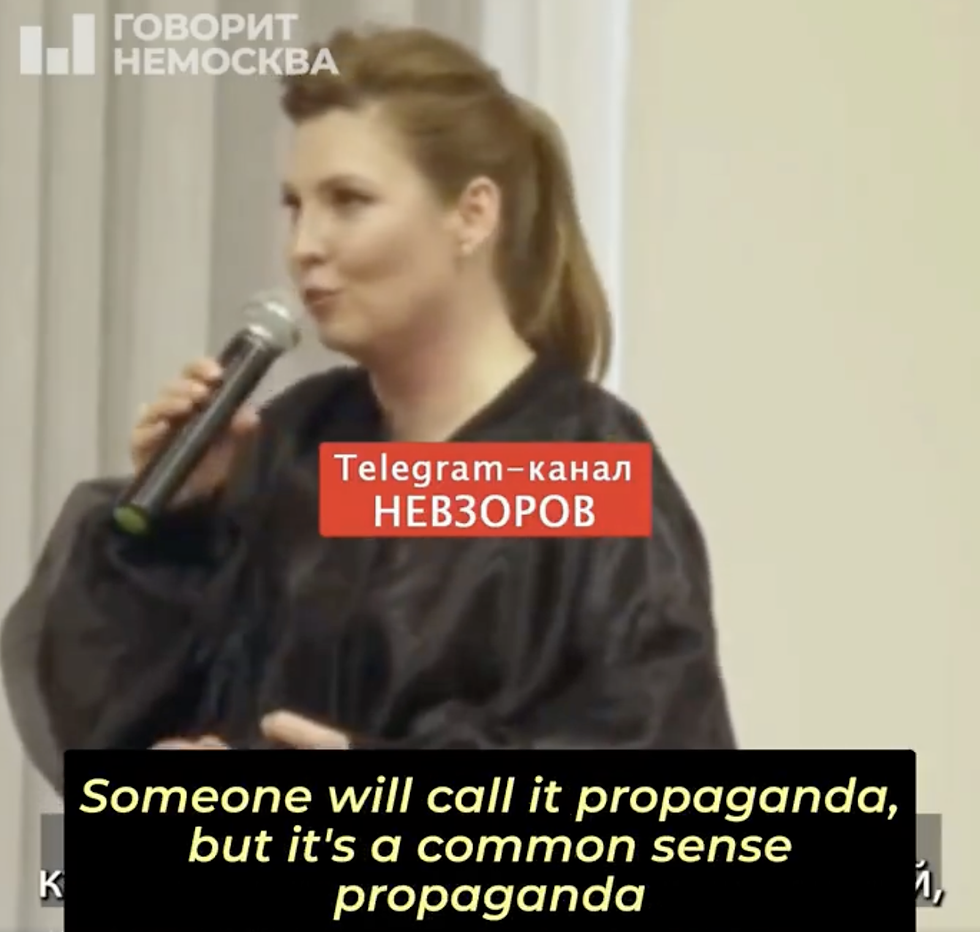Russian State Media Finally Admits it is Propaganda & that “Truth No Longer Exists”
- May 6, 2024
- 3 min read

Olga Skabeyeva, a notorious Russian propagandist and state television host, has played a pivotal role in shaping public opinion in Russia, particularly regarding Ukraine, for over a decade leading up to the full-scale invasion. In a master class of media manipulation for students in Kaluga, Russia, she told how the era of truth has come to an end, giving way to a post-truth era of interpretation manipulation.
Interpretation Over Truth
“What is going on is not the main concern. Listen carefully…While an event may occur on a specific day, it’s the interpretation of this event that holds true significance. It is what they probably call, in the modern-day world, the age of post-truth. […] The actual event of a missile strike is not the most important factor; well, it is, but it’s not what matters; it’s how we or they relate to the strike that matters. Their [the West’s] interpretation of our strikes on Kharkiv oblast are being regarded as [Russian] aggression, whereas we regard everything we are doing in Kharkiv as an aim to establish a sanitary zone.”
Skabeyeva is essentially instructing the younger generation to discard their previous beliefs about morals and truth. Instead, she encourages students to embrace the idea that true Russian patriotism entails unquestioningly accepting the state’s interpretation as the absolute truth, even if it involves endorsing disinformation knowingly.
“If we consider ourselves patriots, it’s better to align with the state’s point of view and work for the state. Some might label it as propaganda, but it’s essentially propaganda of common sense.”
She acknowledges that this endorsement isn’t rooted in accuracy or ethical considerations but rather in adherence to the directives of the Russian state—and she sees this as a source of pride. Why? Because it aligns with what she and the state define as patriotism.
Russia’s Ministry of Truth
Russian propaganda often draws comparisons to Orwell’s “1984,” and while it may seem cliché to make this comparison once again, the parallels are impossible to deny. Just like the Party’s Ministry of Truth in Orwell’s novel, Russian state media fabricates and alters information to maintain control over history and shape the narrative.

Skabeyeva during her propaganda masterclass
The propagandist effectively admits that Russian-state media has no business practicing objective journalism, nor does it have any need. Skabeyeva tells how “There is no such thing as objective information, only information that someone has paid for to pursue one’s goals.”
Objectivity and impartiality in journalism are practices that allow the audience to make up their own mind about a particular event and are a benchmark standard strived for in most democracies. Yet the Kremlin aims to strip the people of their right to deliberate the facts and instead provide the audience with its own interpretation. However, this is nothing new; the Kremlin has been doing this for decades, just not so openly. As Olga herself admits, for Russians, the truth will be whatever the payer wants it to be, and when it concerns Russian state media, of course, the one footing the bill is the Kremlin.
“Its Us vs. Them”
Kremlin propagandists have consistently refuted claims from the West and “Russian opposition” that they engage in propaganda, arguing instead that the West is the true purveyor of disinformation. Yet, with the full-scale war and little pushback, the Russian people have given the Kremlin the excuse it has long searched for to further clamp down on human rights and freedom.
With a newfound confidence not seen in decades, they propagate manipulated information as undeniable truths and openly advocate sidelining objectivity, impartiality, and the truth to serve the state’s agenda. As Skabeyeva suggests, this marks a new era in the Kremlin’s hybrid warfare strategies. However, her optimistic portrayal masks the reality. By framing it as an opportunity for state prosperity in an “us vs. them” narrative, she essentially manipulates the younger generation into endorsing such manipulation. This only further blurs the line between fact and fiction, creating an environment ripe for propaganda to thrive.
Navigating this balance should be a difficult task for the propaganda apparatus, as it should result in questions, protests, and outrage about the credibility of all past, present, and future messages promoted by the Russian state, as well as the true motivations driving them. If the Russian people were more questioning or less compliant (which they are not due to years of oppression and psychological manipulation by Soviet and then Russian propaganda), they might wonder who the true beneficiaries of these narratives are.
Written by Matt Wickham, analyst HWAG/UCMC. The article was prepared for publication by volunteers from the Res Publica - The Center for Civil Resistance.





Comments